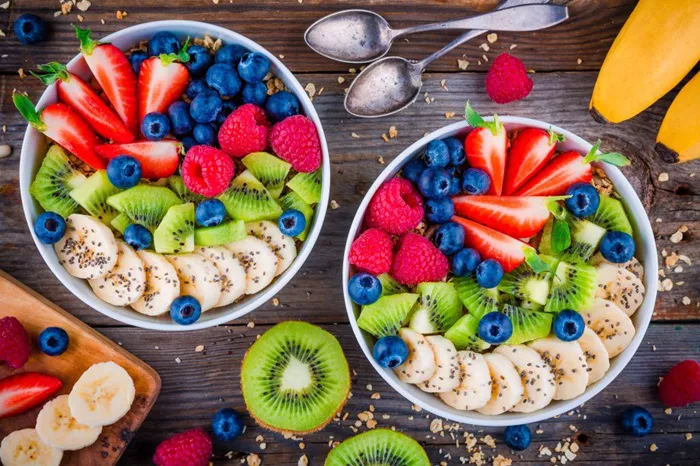Protein is an essential macronutrient that plays a critical role in building and repairing tissues, producing enzymes and hormones, and supporting overall bodily functions. While many people associate protein with animal products like meat, dairy, and eggs, it’s also important to explore plant-based sources. Among these, fruits are often overlooked as potential contributors to our daily protein intake.
Understanding Protein in Fruits
Fruits are not typically recognized for their protein content because they generally contain much less protein than other food groups like legumes, nuts, seeds, and animal products. However, some fruits do contain notable amounts of protein, making them a valuable addition to a balanced diet, especially for those following vegetarian or vegan lifestyles.
Fruits Rich in Protein
1. Guava
Guava stands out as one of the highest-protein fruits, offering approximately 4.2 grams of protein per cup. This tropical fruit is also rich in dietary fiber, vitamin C, and antioxidants, making it a nutritious addition to smoothies, salads, or as a standalone snack.
2. Avocado
While often categorized as a fruit, avocado is unique due to its high-fat content. A medium-sized avocado contains about 3 grams of protein. Additionally, avocados are packed with healthy monounsaturated fats, vitamins, and minerals, making them a versatile ingredient for various dishes.
3. Apricots
Dried apricots are a convenient and protein-rich snack, with about 2 grams of protein per 100 grams. They are also an excellent source of vitamins A and C, potassium, and dietary fiber. Fresh apricots, though lower in protein, still contribute to a protein-rich diet.
See Also: 8 Essential Vitamins to Boost Your Immune System
4. Blackberries
Blackberries provide around 2 grams of protein per cup. These berries are not only a good source of protein but also rich in fiber, vitamins, and antioxidants, which support overall health and wellness.
5. Oranges
While oranges are more renowned for their vitamin C content, they also offer a modest amount of protein. A single orange contains about 1.2 grams of protein. Including oranges in your diet can enhance your protein intake while providing essential nutrients like folate and potassium.
Other Noteworthy Fruits with Protein
1. Kiwi
Kiwi fruits contain approximately 2.1 grams of protein per cup. They are also rich in vitamin C, vitamin K, and fiber, making them a nutrient-dense choice for a healthy diet.
2. Mulberries
Mulberries offer around 2 grams of protein per cup and are a great source of vitamin C, vitamin K, and iron. They can be consumed fresh, dried, or as part of various recipes.
3. Jackfruit
Jackfruit is a tropical fruit that can provide up to 3 grams of protein per cup when cooked. It is often used as a meat substitute in vegetarian and vegan dishes due to its texture and versatility.
The Importance of a Diverse Diet
While these fruits can contribute to your daily protein intake, it’s essential to maintain a diverse diet that includes other protein-rich foods. Legumes, nuts, seeds, whole grains, and vegetables should also be incorporated to ensure a balanced intake of all essential amino acids.
Combining Fruits with Other Protein Sources
To maximize your protein intake, consider pairing fruits with other protein-rich foods. For example, adding nuts or seeds to a fruit salad, blending protein powder into a smoothie, or enjoying fruits with yogurt or cottage cheese can significantly boost the overall protein content of your meals.
Protein Needs and Dietary Considerations
Individual protein needs vary based on factors like age, gender, activity level, and overall health. Generally, the Recommended Dietary Allowance (RDA) for protein is 46 grams per day for adult women and 56 grams per day for adult men. However, those with higher physical activity levels or specific health conditions may require more.
Health Benefits of Protein in Fruits
Incorporating fruits with protein into your diet can offer various health benefits:
Muscle Maintenance and Growth: Protein is essential for muscle repair and growth. Including protein-rich fruits can support these processes, especially for individuals engaged in regular physical activity.
Satiety and Weight Management: Protein-rich foods promote a feeling of fullness, which can aid in weight management. Fruits with protein can be a satisfying snack that helps control hunger between meals.
Nutrient Density: Fruits are naturally rich in vitamins, minerals, and antioxidants. Choosing protein-rich fruits ensures you’re not only getting protein but also other essential nutrients that support overall health.
Protein Quality and Bioavailability in Fruits
It’s important to consider the quality and bioavailability of protein in fruits. Unlike animal proteins, plant proteins are often incomplete, meaning they lack one or more essential amino acids. However, by consuming a variety of plant-based proteins throughout the day, you can still meet your amino acid needs.
Enhancing Protein Absorption
Certain food combinations can enhance the absorption and utilization of protein. For example, pairing vitamin C-rich fruits like oranges or kiwi with iron-rich plant foods can improve iron absorption, which is crucial for oxygen transport and energy production.
Practical Tips for Including Protein-Rich Fruits in Your Diet
Smoothies: Blend high-protein fruits like guava, kiwi, and blackberries with leafy greens, nut butter, and a protein supplement for a nutritious and protein-packed smoothie.
Salads: Add sliced avocado, dried apricots, and blackberries to your salads for a protein boost. Top with nuts or seeds for added texture and protein.
Snacks: Keep dried apricots or a mix of dried fruits and nuts on hand for a convenient, protein-rich snack.
Breakfast: Incorporate protein-rich fruits into your breakfast by adding them to oatmeal, yogurt, or whole-grain toast with nut butter.
Conclusion: The Value of Protein in Fruits
While fruits are not typically known for their protein content, certain varieties can contribute meaningfully to your daily protein intake. By understanding which fruits are higher in protein and incorporating them into a balanced diet, you can enjoy the benefits of a nutrient-dense, plant-based protein source. Remember to combine these fruits with other protein-rich foods to ensure you meet your nutritional needs and support overall health and wellness.
[inline_related_posts title=”You Might Be Interested In” title_align=”left” style=”list” number=”6″ align=”none” ids=”10542,10500,10431″ by=”categories” orderby=”rand” order=”DESC” hide_thumb=”no” thumb_right=”no” views=”no” date=”yes” grid_columns=”2″ post_type=”” tax=””]


































